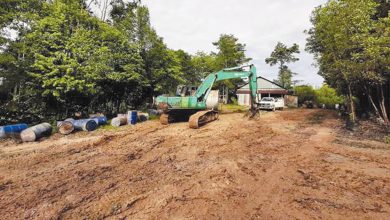Ipoh’s Reputation Trashed
by Mariam Mokhtar
Last March, Ipoh Mayor Dato’ Roshidi Hashim, said that the Ipoh City Council (MBI) was hoping to achieve an 80 per cent level of cleanliness in the city by August. It is now November and a public spat is brewing between the residents of Ipoh and MBI, each side is blaming the other and the tussle is most disheartening.
Ipoh is a city which is struggling with its image. Previous nicknames give an insight into its former glory; ‘City of Millionaires … Town That Tin Built … Bougainvillea City’ and presently, ‘The Green, Clean and Developing City’. Many senior citizens will fondly recall the Ipoh of yore, which they claim is nothing like what it is today.
Lately, over-flowing bins, discarded black bin bags, streets littered with refuse, clogged drains, stray dogs rummaging for food and rats are not just an eyesore but a health hazard. No area is spared. Inhabitants of new townships on the outskirts of the city, and the privileged people in the posh residential areas, have grown familiar with the unsightly mess of growing piles of rubbish.
One person may dump a plastic bottle under a tree, or by the road side, and before long the litter assumes a life of its own and grows from a tiny mound to a mountain of muck. Branches from a pruned garden, left by the roadside, will attract more garden waste from elsewhere, until the compost heap stretches along the road.
Uncut grass verges encroach into drains, causing weeds to choke the flow of water, thus increasing the chances of mosquito infestation. Snakes and monitor lizards from unkempt areas have invaded the gardens and homes of readers.
At one time council workers would demand to inspect the gardens of residential homes, and then impose a fine for growing large leaved plants like the crab-clawed heliconias or pitcher plants; these plants had large foliage or flowers which would naturally hold rainwater.
It is frustrating to speak to council officials who refuse to acknowledge that fogging is not as effective as the regular servicing of drains or clearing of rubbish. Piles of rubbish, with empty tins of stagnant water and rotting food which attracts vermin, pose a serious health risk.
Recently, Mayor Roshidi admitted that he was unable to keep the city clean and faulted the residents for the filthy state of the city. He was right to an extent, as residents are partly to be blamed for the state of affair. However, those who pay their assessment rates promptly and are very civic conscious strongly believe they are being short-changed, especially with respect to keeping their city clean.
Irregular rubbish collection will inevitably result in illegal dumping of rubbish. When the city’s rubbish trucks make irregular trips to residential areas, it is not the residents fault. When the rubbish men leave some of the rubbish behind, it is not the fault of the house-owner.
If there are insufficient garbage bins in and around eateries, patrons and food peddlers cannot dispose of their litter properly. If blocked public drains are only cleared after the city council has received repeated calls from irate citizens, the public services cannot be deemed to be efficient.
If small, manageable back-garden bonfires are not permitted, how can people dispose of their garden trimmings? Why doesn’t MBI allocate each home a few large, reusable, heavy-duty garden refuse bags so that each fortnight, garden waste like twigs and grass cuttings can be collected? The council could convert this into compost and sell it back to the public for use in their gardens.
Why doesn’t MBI install more recycling bins in the city centre, and bigger dedicated recycling collection centres in and around Ipoh, for recycling garden waste, discarded furniture, old electrical goods, household waste, used motor oil and old batteries?
Is Ipoh’s rubbish problem because of a shortage of money, an ineffective rubbish programme or incompetent rubbish contractors? Some people wonder if workers are supervised adequately. Are rubbish prone areas adequately monitored? Is enforcement effective?
Are our schoolchildren being taught the importance of cleanliness? Youngsters who are empowered can reach out to their older relatives and educate them. Are there adequate numbers of public education programmes?
Perak Menteri Besar, Dato’ Seri DiRaja Dr Zambry Abd Kadir, wants Perak to be a developed state by 2015. With strict controls and enforcement, developed countries like Japan, Singapore, Switzerland, Germany and Denmark are proud of their recycling efforts and rubbish disposal record.
The problem of rubbish, just like safety, is everyone’s responsibility. Ipohites would like to know how the mayor and his councillors want to resolve the rubbish problem. MBI should consult the public as well as talking to companies which want to secure local government contracts.
Efficient rubbish collection is like baking a cake. You throw in the right ingredients, in the appropriate order and everything will come out alright.


